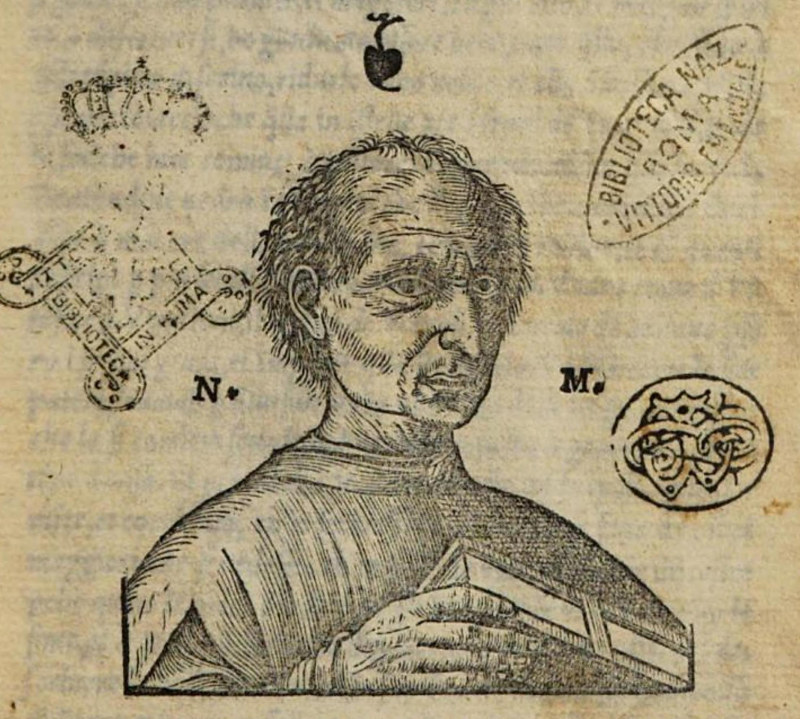From Public Domain Review:
Most familiar today as the godfather of Realpolitik and as the eponym for all things cunning and devious, the Renaissance thinker Niccolò Machiavelli also had a lighter side, writing as he did a number of comedies. Christopher S. Celenza looks at perhaps the best known of these plays, Mandragola, and explores what it can teach us about the man and his world.

Illustration of Machiavelli featured in the title page to Historie di Nicolo Machiavegli cittadino & secretario fiorentino (1540) – Source.
“Comedian”, admittedly, isn’t the first word you associate with Machiavelli. And “funny” is not a word normally applied to Lucretius. And yet, through some strange alchemy of time, circumstance, and the rhythms of Renaissance life, those seemingly discordant elements came together in a remarkable way. You could argue that Machiavelli’s entire worldview was comic, but comic in a peculiar way: ironic, wry, a little melancholy, punctuated by an earthy vulgarity that, these days, would get him thrown off a university faculty in a minute. More than this, the central premises of what was funny have changed so significantly that it invites us to think about how comedy works and when it’s time to say that a comedy, however venerable, just isn’t funny anymore.*September 2008's "Hank Paulson, George Washington and Benito Mussolini Walk Into a Bar: Part I":
Take his play, Mandragola, or, in English, “The Mandrake Root.” The odd title (and it would have been odd in Machiavelli’s day, too) has to do with fertility. The plant appears in the Bible, in contexts where carnal knowledge is in question, like when Leah, one of Jacob’s two wives, wants to convince him to lie with her (Gen. 30:14-16), or when, in the Song of Songs, a woman sings a song of her own seductiveness “I am my beloved’s, and his desire is toward me … The mandrakes give a smell, and at our gates are all manner of pleasant fruits ….” (Song of Songs, 7:10-13). If the lasting biblical associations of the plant had to do with love, the herb also had magical and spell-like connotations. It could be thought to induce a great and powerful sleep, and in some accounts was even thought to cry out when pulled from the earth.
Machiavelli’s title enfolded many of these meanings. The play concerns a young man, Callimaco, who though Florentine in origin spent much of his youth in France. From clues in the play we learn he is about thirty years old and that the action is set in the year 1504. At a gathering of friends, all male of course, a debate breaks out over who has the more beautiful women, France or Italy. Though the debaters give the palm to French women, one of his Florentine friends says he has a relative, Lucrezia, whose beauty is unequalled anywhere. Callimaco becomes curious to the point of leaving France and going to Florence. There his curiosity escalates to passion, as he is all but driven mad by love after finally laying eyes on Lucrezia.
As it happens Lucrezia is married to a slow-witted lawyer named Messer Nicia. They have been trying unsuccessfully to have children. Ligurio – a matchmaker and, not coincidentally, a friend of Callimaco – suggests that the couple’s troubles may allow Callimaco to get close to Lucrezia....MORE
Back in high school, it was in either a civics or history class, we had a two week module on Machiavelli's The Prince. I asked the teacher if I could spend the time reading Niccolò 's Discourses on the first Ten Books of Titus Livy instead. I did this for a couple reasons:S&P 2069.10.
a) I knew where I could buy a paperback copy for a quarter.
b) I had to do something about the 'D' I was achieving to that point in the class.
The downsides were:
a) It was written at a level above my head.
b) It is a much longer book than The Prince.
(ask any teenager how important this consideration is)...